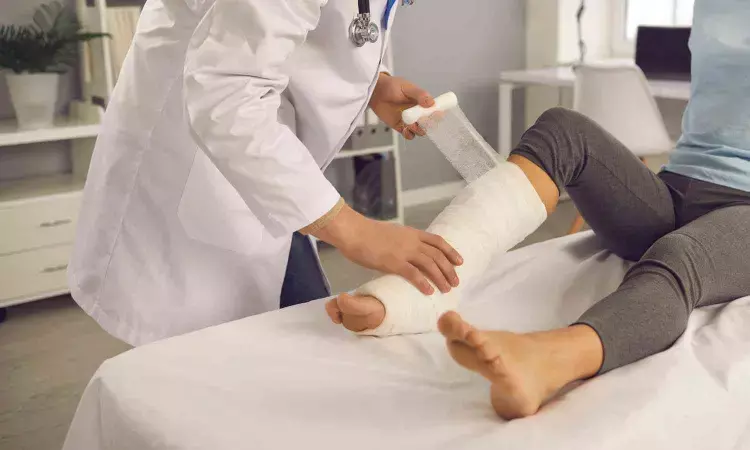- Home
- Medical news & Guidelines
- Anesthesiology
- Cardiology and CTVS
- Critical Care
- Dentistry
- Dermatology
- Diabetes and Endocrinology
- ENT
- Gastroenterology
- Medicine
- Nephrology
- Neurology
- Obstretics-Gynaecology
- Oncology
- Ophthalmology
- Orthopaedics
- Pediatrics-Neonatology
- Psychiatry
- Pulmonology
- Radiology
- Surgery
- Urology
- Laboratory Medicine
- Diet
- Nursing
- Paramedical
- Physiotherapy
- Health news
- Fact Check
- Bone Health Fact Check
- Brain Health Fact Check
- Cancer Related Fact Check
- Child Care Fact Check
- Dental and oral health fact check
- Diabetes and metabolic health fact check
- Diet and Nutrition Fact Check
- Eye and ENT Care Fact Check
- Fitness fact check
- Gut health fact check
- Heart health fact check
- Kidney health fact check
- Medical education fact check
- Men's health fact check
- Respiratory fact check
- Skin and hair care fact check
- Vaccine and Immunization fact check
- Women's health fact check
- AYUSH
- State News
- Andaman and Nicobar Islands
- Andhra Pradesh
- Arunachal Pradesh
- Assam
- Bihar
- Chandigarh
- Chattisgarh
- Dadra and Nagar Haveli
- Daman and Diu
- Delhi
- Goa
- Gujarat
- Haryana
- Himachal Pradesh
- Jammu & Kashmir
- Jharkhand
- Karnataka
- Kerala
- Ladakh
- Lakshadweep
- Madhya Pradesh
- Maharashtra
- Manipur
- Meghalaya
- Mizoram
- Nagaland
- Odisha
- Puducherry
- Punjab
- Rajasthan
- Sikkim
- Tamil Nadu
- Telangana
- Tripura
- Uttar Pradesh
- Uttrakhand
- West Bengal
- Medical Education
- Industry
Blood pressure drugs more than double bone-fracture risk in nursing home patients: JAMA

Records from nearly 30,000 nursing home residents indicate that blood pressure medications more than double the risk of life-threatening bone fractures, according to Rutgers Health research.
The authors of the study, which appears in JAMA Internal Medicine, said the increased risk stems from the medications’ tendency to impair balance, particularly when patients first stand up and temporarily experience low blood pressure that deprives the brain of oxygen. Interactions with other drugs and low baseline balance in many nursing home patients compound the problem.
“Bone fractures often start nursing home patients on a downward spiral,” said Chintan Dave, academic director of the Rutgers Center for Health Outcomes, Policy and Economics and lead author of the study. “Roughly 40 percent of those who fracture a hip die within the next year, so it’s truly alarming to find that a class of medications used by 70 percent of all nursing home residents more than doubles the bone-fracture risk.”
While many patients have high enough blood pressure that the benefits of treatment outweigh these dangers, "Such patients require careful observation, particularly when treatment begins, and that’s not happening,” Dave said. “Caregivers think of blood pressure medication as very low risk, and that’s not true in this patient population.”
Dave’s team analyzed Veterans Health Administration data from 29,648 elderly patients in long-term care facilities from 2006 to 2019. Researchers compared the 30-day risk of fractures to the hip, pelvis, humerus (upper arm) radius or ulna (forearm) for patients who began using blood pressure medications with similar patients who didn’t. To maximize the chance that medication use-and not some other factor-drove the different outcomes, they adjusted for more than 50 baseline covariates, such as patient demographics and clinical history.
The 30-day fracture risk for residents who began blood pressure medication was 5.4 per 100 people per year and 2.2 per 100 people per year for patients who took no blood pressure medication.
Further analysis showed drug usage predicted particularly elevated fracture risk in certain subgroups. Patients with dementia, systolic blood pressure above 139 (the first number in the blood pressure reading), diastolic blood pressure above 79 (the second number) or no recent use of blood pressure medication all experienced at least triple the fracture risk of unmedicated patients.
About 2.5 million Americans live in nursing homes or assisted living facilities. Up to 50 percent suffer falls in any given year, and up to 25 percent of those falls result in serious injury.
The Rutgers Health study indicates that blood pressure medication causes many of those falls and that a combination of less medication and better support could significantly reduce the problem.
“Caregivers can’t strike this right balance of risk and reward if they don’t have accurate data about the risks,” Dave said. “I hope this study gives them information that helps them serve their patients better.”
Reference:
Dave CV, Li Y, Steinman MA, et al. Antihypertensive Medication and Fracture Risk in Older Veterans Health Administration Nursing Home Residents. JAMA Intern Med. Published online April 22, 2024. doi:10.1001/jamainternmed.2024.0507
Dr Kamal Kant Kohli-MBBS, DTCD- a chest specialist with more than 30 years of practice and a flair for writing clinical articles, Dr Kamal Kant Kohli joined Medical Dialogues as a Chief Editor of Medical News. Besides writing articles, as an editor, he proofreads and verifies all the medical content published on Medical Dialogues including those coming from journals, studies,medical conferences,guidelines etc. Email: drkohli@medicaldialogues.in. Contact no. 011-43720751


